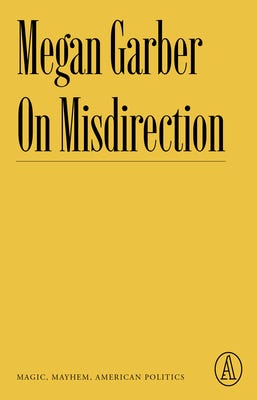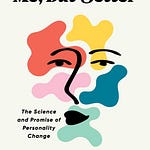
By Walt Hickey
Welcome to the Numlock Sunday edition.
This week, I spoke to Megan Garber who wrote the new essay collection On Misdirection: Magic, Mayhem, American Politics from The Atlantic.
Megan is a writer at The Atlantic, and the magazine has compiled a number of her essays into the new book. It’s a great read, an exploration into the ways that American political actors have parlayed the techniques of entertainment to their own ends. Today, we talked about amusing ourselves to death, what happens to a country when politics becomes entertainment, and Dwight Schrute.
Megan can be found at The Atlantic and the book, as well as several other new compilations of essays from the magazine, is available wherever books are sold.
This interview has been condensed and edited.
Megan Garber, thank you so much for joining us.
Thanks for having me.
You have a new book, it's a collection of a lot of your essays at The Atlantic, it's called On Misdirection. What prompted you to figure out this beat and tease out that you were covering misdirection over the past couple years?
A lot of the things that have really interested me about politics and political discourse, let's say, over the past few years are the ways that we are trained to see each other and then also to not see each other. It seems like so many things, so many of the big political stories, particularly at the beginning of the presidency of Donald Trump, and then up till now, so much has come down to are we seeing what we should be seeing, or are we in fact looking away from what we should be seeing?
Ideas about vision is actually one of the main drivers of all of these essays, which are very different other than that. I'm a political junkie, I love to follow politics and all of that, but I kept feeling for myself just as a news consumer, "Is this really the most important thing right now?" All these shiny distractions, daily outrages that come and go, and I know I myself, as a news consumer, often feel very addled, almost, and just in a constant state of distraction.
So these essays really do try to figure out what happens to that form of distraction on a mass scale. If I'm not the only one feeling this, but if a lot of people are feeling this, what are the consequences of that?
I loved how also you kept it in some of the more conventional forms of media as well, too. I know that a lot of our conversation about distraction has been related to social media and algorithms and kind of blamed on Silicon Valley ghosts that are destroying our brains.
But a lot of what you talk about is just super day to day. It's the way people talk about other people, whether it's on television or radio or things like that. Do you want to expand on how it's not just necessarily what we're doing online?
The first essay, actually, is a look-back at the scholar Neil Postman, who's one of my favorite thinkers, critics, et cetera. He wrote a book called Amusing Ourselves to Death in 1985 that was looking at the impact of television, essentially, on American culture. And as you might guess from the title, making an argument that the entertainment has slipped the bonds of mere fun and mere escapism and distraction and has actually come into our lives and come to infiltrate lives in a lot of ways.
Looking at him in retrospect is the first essay in the collection. We chose that specifically because I think one of the other arguments underlining a lot that's in the book is that entertainment, as much as I love it, and I am an inveterate lover of entertainment of all kinds, but it can, I think, also become fairly pernicious when it becomes our standard of judging things in the political realm.
One example that's in another essay in there is the first impeachment trial of Donald Trump. The talking points, it seemed to me, among Trump's allies had nothing to do with the facts at hand. This was a legal proceeding, conducted by lawyers, by Meta lawyers, in fact, in Congress. Yet the arguments were nothing to do with the facts, but "this is boring." That was essentially what it came down to. "Ugh, snooze, ugh, no one's watching this." All that kind of stuff.
When again, this was an impeachment trial of a president, there were facts at play, and yet the talking points completely elided that. What struck me as well, though, was it was not just partisan talking points. One news organization had an entire op-ed about the impeachment trial, sort of complaining that it lacked pizazz. Pizazz was literally the word that was used.
I think there's this way that if we're not careful, the sort of logic of entertainment itself, this idea that everything has to be fun, that boring is its own kind of factual argument, that's what can happen. That was what Neil Postman was talking about.
That, I think, is what's happening right now, too, where just entertainment becomes the only thing that matters at the end of the day. That can become, I think, pretty quickly dangerous and bad for us as a culture.
That was a really remarkable argument in the book. Again, I'm a huge fan of pop culture. I like being entertained, but it just felt weird how so much of the language and the desire of pop culture was being adapted and weaved into politics.
You mentioned obviously Trump, and rallies, and the impeachment, but you had an example in there about Pete Buttigieg after the Iowa Caucus that I thought was really potent where it's just, the question isn't like, "Did we win?" It's like, "Aren't we having so much fun?"
Exactly right, and the Iowa Caucus is as famous and infamous for not having an immediate result. Very quickly, things went awry in a quite extreme manner there. Exactly what you said, Pete Buttigieg put out a talk saying, "We have shocked the nation," claiming victory even though no such victory had been claimed. Just like you said, this idea that shock is even part of the conversation, that shock is a value on its own, I think just speaks to the way that fun and high emotional stakes of everything are infiltrating, I think, our rhetoric and logic as a culture.
I think also just we talk a lot about overheated rhetoric. Just everything is heated, and everything is ratcheting up at all times, and I think one of the extensions of the ratcheting is that we as news consumers and as citizens just become accustomed to evermore levels of drama, of outrage, of everything. We're sort of losing the ability, I think, to have a moderate anything in our conversations. Everything is just bigger, dramatic jazz hands.
So, we may as well get to some of the heart of this. There's obviously a guy who comes up a couple times in your book who is very good at this, bit of a controversial figure, but you just keep on coming back to him, I think, for reasons that are clear.
What draws you to Dwight Schrute?
I will say, during the early days of the pandemic, I've always been a fan of the show The Office, and I went back to it as a comfort watch, a soothing watch in these really awful days. I was newly familiar with The Office.
For anyone who might not be familiar, The Office is a U.S. sitcom, but it focuses on a very small office in Scranton, Pennsylvania. There is a boss, Michael Scott, who is kind of an oaf in a lot of ways. And then one of the other characters in the show is, yes, Dwight Schrute, who I've always been fascinated by, because he's this amazing contradiction, this walking category error.
He is a beet farmer, but he has these authoritarian tendencies. I'm trying to think of how to describe Dwight. He's just a lot of things at once. I think one of the things that's so interesting about him is that he is this person who very much thinks that he knows better than everyone else what the rules are, that he can decide the rules for himself and then, importantly, inflict them on other people.
So, Dwight thinks he is basically the ultimate agent of law enforcement, literally and otherwise, in the office. In fact, again and again is a physical danger to his colleagues. Just that tension in Dwight felt very resonant to me, as you say, for other political figures and power players as well. I wanted to look at Dwight as almost a character and a trope who conveys so much about the people in political power, often, who make up their own rules and then enforce them and inflict them on everyone else.
This idea of, "We're doing it because I said so," and that's the only explanation you're going to get, and these lies that just, everyone just lies without any real sense of backlash or anything. And a lot of that, to me, seemed to be conveyed in Dwight.
There's an appeal to him. You can understand, in a democracy where appeal is a key component of accessing power, that despite the obvious flaws in his leadership capabilities for a large duration, you can see how a guy like that just might appeal to a large group of people. I guess we can now broaden it out a bit, how do you think that applies to American society as a whole?
A lot of the supporters of the fellow we've been talking about, poll after poll suggests that they feel a sense of encroachment. They feel like they used to be de facto at the top of American society and feel like now they are being pushed down a bit. I think there's a lot of indignation there and a lot of wanting to feel a little bit reassured that, "No, you still do have power. You still do. You can still say for everyone else, as you have throughout history."
I think there's something about Dwight definitely that sort of conveys that idea. Donald Trump, very famously and infamously, promised, "I alone can fix it," with 'it' being fill in the blank. There's something in that message, there's something very reassuring to people who feel very caught in a tumult and who feel very unsettled and everything. So much is in flux right now and I think to just have that sort of authoritarian presence who can just say, "Trust me, I've got this. I can make the world make sense again," I think there's something very appealing just about that message.
Then, of course, there's a question of how true that is, how politically problematic that is, et cetera. But in terms of rhetoric, I think that's very powerful. There's the adjunct to that message, which is if Donald Trump can say what's what, if he can look at an orange and say it's an apple, and just by force of will have the orange in some sense become an apple, I think there's also a silent message to people that they might have that same agency. They can still be the ones who decide. There's a very powerful message in that.
You had a line toward the end of that essay, I think, that was just resolving Dwight's arc. You wrote this I think in October 2020, which was a fascinating time for a lot of people. You basically wrote that "his arc as an agent of chaos is simply not sustainable." Toward the end of it, he domesticates a little bit just because that's what folks want. I guess, how do you see that potentially applying beyond strictly the American television program The Office?
One of the things that's so interesting to me about The Office itself is that you could see, or at least when I was rewatching it, what really struck me as a writer — not a writer of sitcoms, but a writer in general — I could see the type of arc that they were trying to give different characters. Just like you said, Dwight, after a while, a character like that can't simply stay an agent of chaos. There has to be some kind of evolution and some kind of arc to the character, or else it just gets too repetitive.
Something about the arcs, I think, is very revealing because I think to the Neil Postman point, in the very broad sense, Americans are being conditioned to understand the world in roughly the same way as a sitcom understands the world, which is a character like Dwight needs, the arc needs, the evolution needs a bit of catharsis at the end.
A lot of us are now coming to see the world itself in those terms, where we expect our political stories, we expect our real stories of everyday life to also have some tidy conclusions, to also mimic the flow of a TV show and a sitcom.
That's one thing I would say, there is this logic of sitcom built into things, and I think that's what can make so many of the problems we have, which are so big and intractable — climate change would be one I would point to — that really resists a Schrutean narrative arc.
It makes it sometimes hard for us to talk about. I would also say that The Office's writers recognized how deeply viewers — and I would also then say citizens and people and news consumers — how desperately we crave a catharsis at the end, in whatever form that might look like. Catharsis is a very important idea, both in sitcom writing and in the broader world.
I like that idea. I do want to talk to you a little bit about the arc of your book, which was really, really great. It's a collection of essays, and I imagine that the order in which you present them, there was a lot of thought that went into that. You kick it off very much talking about irony and satire and how they're having a good moment, you talk a little bit about the Science March. I'll let you take it from there a little bit.
But in the end, you also finish on the idea that "if you brand yourself an entertainer and not a journalist, you can spread falsehoods in the name of fun." You start off in a place where people are having fun for, one might think, deliberate and somewhat positive-facing means. And then in the end, that can get co-opted in a manner. Do you want to maybe talk about some of that?
Sure, and thank you, that's such a good observation, totally.
The book begins in this essay about Neil Postman looking at the March for Science, which it was put on in the same general time that the Women's March was happening, that people were trying to find ways to protest against the new presidency. This was a march that was very self-consciously designed to support science, facts, et cetera. I did not attend myself, but I was looking through Instagram afterward and looking at all the photos, and that's the way of the modern march, is to have your march, which happens in person, translate to Instagram, translate to memes.
One of the things that you're supposed to do, really, as a good attender of these marches is to come up with a costume that will go viral, perhaps. I mean, there were some really good jokes, they were great, they were great costumes, great signs, all that stuff. But I just kept thinking, what now? Speaking of catharsis, is this enough catharsis for people? Is this going to feel like, okay, well we did this, so what else can we do? That's enough. We've had our catharsis, we've made our point?
I don't mean to suggest that everyone involved just stopped at the march, but I do think that sometimes when this becomes our mode of political expression, there is a little bit of a, "Okay, but how are we going to actually defend science in real life? How are we going to defend women's rights in real life?" I worry sometimes that just the fun itself and the act of togetherness and all of that can be its own catharsis, and then not actually translate to additional action in the real world.
That's a real, good point. I do want to stay here, because I know that we're on a roll, but it is interesting because the Science March, it seemed a very fun vibe. Everybody picked their favorite XKCD, it was a good time.
Then if you were to compare that, as you just did, to the Women's March, which was not distinctly as much of a good time, one of those movements had a little bit more staying power, one might say.
That's totally right. I want to also be clear that I think the fun elements of things can be great. Throughout American history, fun has been an important means of political expression. People sometimes forget the book Common Sense, the Thomas Paine track that at some level really did help to foment the revolution, not only was it passionately argued and this very compelling piece of rhetoric, it was also just really funny. It was a work of entertainment. People would read it aloud to each other around the fire, and it had that level of making politics fun.
That is a really important element of politics, to make people feel engaged. But then I think for me the question is: To what extent does the fun encourage us? To what extent does it activate us? To what extent does it bring us together in community, or to what extent does it sort of alienate us from the reality of politics and condition us to see, again, everything as entertainment? In which case the fun isn't the means, but the fun is the end, essentially.
Do you want to talk a little bit about how you close the book? I know you talk a little bit about Tucker, but you also talk a little bit about basically how everybody's having fun now.
It's not just a technique used by those out of power to somewhat mock and undermine those in power, it's also used to enforce it a little bit, too.
Speaking of Tucker Carlson, he famously in a legal case, his lawyer argued on his behalf that he is not a journalist, he is an entertainer and therefore can say anything he wants to say, and that argument won, that argument held sway.
I think again and again, rhetoric that I would see as propaganda that really is designed to make certain Americans think that other Americans are less American and in some sense less human, that's a big part of the rhetoric going on in that show. It comes across, it is presented as entertainment. It's presented as, "Ah, we're just asking questions." Like, "Oh, it's not that big of a deal."
There's a real minimization of rhetoric that I find to be very dangerous and frankly scary. We see that idea again and again. One of the subsidiary ideas that I tried to consider in these essays is, "What does propaganda actually look like?" Because at least for me, when I hear that word, I think of Soviet billboards and I think of the mid-century and very sort of overt, direct, "You should believe this."
And now propaganda has taken on this much more insidious form where it's the same types of messages, it's the same attempt to win hearts and minds over to a cause, whatever the cause may be. But the propaganda itself is not overt; instead it is very buried in just messages that look like fun, that look like just entertainment. That is a really scary development because it means the propaganda can have even more power than it might otherwise to affect the way people see the world.
Again, I really enjoy your work. I'm so happy that it's been compiled into this, On Misdirection.
I have recently, and then for a little bit of a while, I have had increasingly complicated feelings toward The Daily Show with Jon Stewart. I was a teenager during the Bush administration, and that was very much, I think, something that was formative for me.
But I think it's impossible to look at what came after and what that flowed into, even Tucker directly, somewhat, through that somewhat fateful Crossfire interview. I think it's impossible to look back at the past 15 years and not see the fingerprints of that on a lot of different political movements that are not necessarily what it was originally going for.
Yeah, that's such a good point. I would say, too, I mean, I think The Daily Show in my mind is a little bit of a piece of a broader collapse, almost. The Daily Show is very much a response to the rise of just reality TV in general. I would argue that the whole point of that genre is to collapse the real and the fake into one thing and be entirely unclear about where the reality ends and the fiction begins.
The Daily Show is very much an extension of that. Around the same time, you've had just so many other cultural works in that space where the whole point is just to poke fun at the idea that you can even distinguish between fact and fiction. That, to be clear, that is not propaganda on its own, but I would also say that this idea that fact and fiction on some level can't be extricated from each other, that is a very foundational argument of any propaganda.
I think we're starting in the '90s with reality TV, to some extent with social media as well. Where are the people on social media, are they people at all or are they characters in a show? It can be very hard to tell. We've been on this path since at least the '90s, possibly before, where just everything blurs together, and the fact looks like fiction, the serious stuff looks like entertainment, the entertainment looks like serious stuff, and everything is just in this blurry, chaotic mess.
Again, you mentioned the Science March, but I went to the Rally to Restore Sanity when I was 20. The fun vibes of that, "We're all in this together." But, like, that was also the thing in D.C. from January 5th to 7th, 2021. I love in your book just how you went through all the different ways that this is manifesting.
Thank you so much. Speaking of the order, we were going for that arc, so I appreciate that that was really clear, because it really does feel like one of those sort of paths that you can see in retrospect. And at the time, it's hard to know what's exactly happening, but now even just 10 years later, five years later, things become much more clear.
And then, too, at the end of the book, the final essay is about how endings themselves, the sense of things will come to a satisfying conclusion, that that alone, that logic — which is so much a product, I think, of movies and TV shows and all of that — how that logic alone can be really pernicious for people, because most things will not have an ending.
Most things are fluid, news stories are fluid. Yes, there are some beginnings and some endings, but usually they're going to defy that in some way. I think as Americans, we are so conditioned to expect the catharsis, expect either the happy ending or the dramatic one. I think the arc of the past few decades really shows how connected everything is and how hard it is to distinguish the beginning of one thing and the end of the other.
I’ve got to say, I almost wonder if it's systemic in the States. The thing that I envy the most about parliamentary systems is that inevitably, the country's leader, "the protagonist," will leave in shame. They will lose eventually.
And you will have a conclusion to the end of the Winston Churchill arc of the United Kingdom. We don't have that. Barack Obama's still around, Donald Trump's still around. I wonder how much that's systemic.
No, that's such a good point. I will admit this is a little bit extreme of me, but I actually do think it's true; you look in pop culture right now and what do we have but sequel, after sequel, after sequel? The highest grossing movies of 2022 were all sequels. We have this idea of the end of endings, essentially. And it's not just in politics, it's sort of everywhere.
On the one hand, we crave the endings and expect the endings, but on the other hand, we live in a culture where nothing necessarily ends. The sitcom, however many years later, will get its almost inevitable reboot. Thanos will clap his hands, and that will all be undone. I won't say anything else for anyone who hasn't seen, but there is this sense, I think, that even the ending is not necessarily an ending. There can be resurrections and all of that stuff. Like you said, the presidency never ends, it just sort of takes its final form.
Do you think that maybe that's going to get people a little bit more comfortable living in that ambiguity of things never necessarily ending?
It might. It very much might, but then I also think that that desire for the ending is just so baked into our culture that I think it will be more of a tension becoming more comfortable with the flux.
Well, you have teed this up perfectly because I would like to end this podcast. Megan, thank you so much for coming on.
Thank you.
This was such a great conversation. Why don't you tell folks where they can find the book, a little bit about it and where folks can find you?
The book is called On Misdirection: Magic, Mayhem, American Politics. It's really just a look at ways of seeing in politics, and the ways that we have of not seeing in politics; how we look at each other, and then fail to look at each other; how our vision is often misdirected by the magicians in power in politics. You can buy the book, as far as I know, wherever books are sold. I know I have a big preference for IndieBound. I love that site, but everywhere books are sold.
Great. I know some of your colleagues are coming out with other ones of these aggregations of essays.
If I could share those, please, that would be great, too. We have Lenika Cruz, my colleague, writing on BTS. She is, I would say, one of the foremost experts on BTS and fandom and it's a lovely book, really. It actually made me very emotional reading it; it's wonderful.
Past and future guest of this particular newsletter, Lenika Cruz.
Oh, you're going to have so much fun. That's great. Then the other one is my friend and colleague, Sophie Gilbert, writing on womanhood and her experiences with womanhood, a feminist examination of pop culture and so much else, and that, too, is beautifully written. It's wonderful. So both of those books are excellent, excellent.
Excellent. All right. Well, hey Megan, thanks so much for coming on. I really appreciate it.
Oh, thank you. This is so nice to talk.
Well, we'll see if we can reboot it next year.
Yeah, inevitably, yes.
If you have anything you’d like to see in this Sunday special, shoot me an email. Comment below! Thanks for reading, and thanks so much for supporting Numlock.
Thank you so much for becoming a paid subscriber!
Send links to me on Twitter at @WaltHickey or email me with numbers, tips or feedback at walt@numlock.news.












Share this post